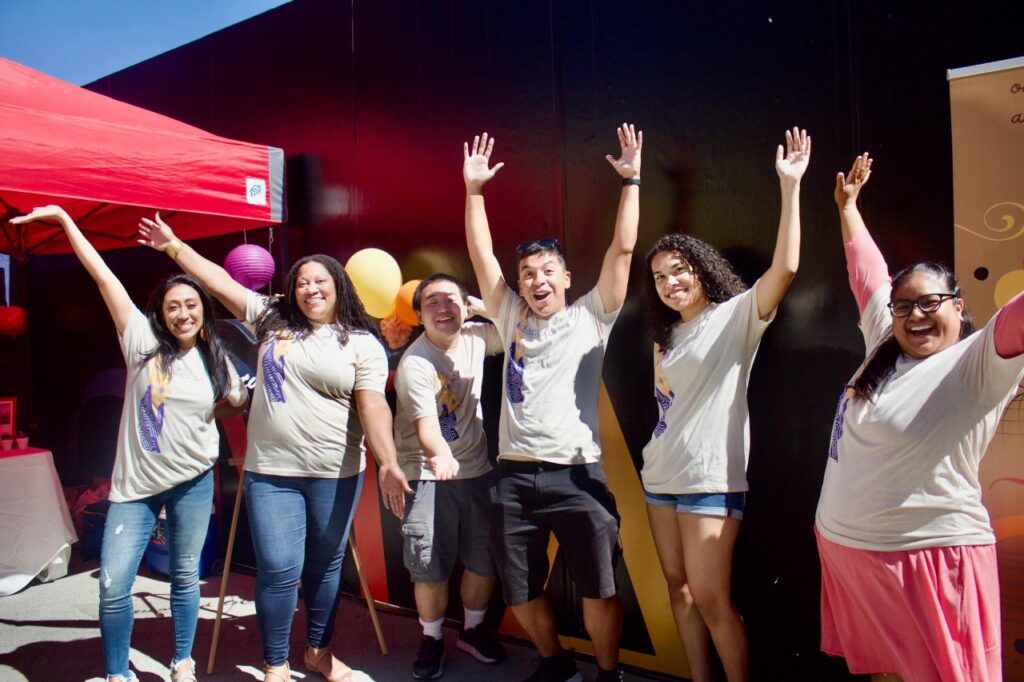
The art of storytelling can take on many forms, and Cal State Fullerton is using the intersection between history and digital media to creatively tell the stories behind the past, present and future of Orange County’s Black-owned businesses and community organizations.
In the summer of 2021, Jamila Moore Pewu, CSUF assistant professor of Digital Humanities and New Media in History, and Natalie Graham, former chair of CSUF’s Department of African American Studies, began exploring the idea of a creative technology collaborative that would allow students in African American Studies classes to also develop skills in digital humanities.
Beginning the fall semester of 2021, through a project titled #Networked OC, 54 students across both Pewu’s History of Orange County course and the university’s Introduction to African American Studies course worked to bridge these two study areas.
In Pewu’s class, students gathered evidence from various archives throughout the county and assembled a library of materials that gave glimpses into Orange County’s history of Black-owned businesses.
Concurrently, students in the African American Studies class established a directory of known Black businesses and interviewed the owners, including those of businesses recently shuttered due to the COVID-19 pandemic.
During the spring semester of 2022, through support from a larger grant, Pewu continued to lead the project forward with a number of additional initiatives.
Nine students from the fall semester received scholarships through the African American Alliance Fund to continue their work on the project. These #Networked OC Scholars completed additional research activities and received professional development training in oral history.
“The idea behind this was to engage them in a longer, more sustained research project,” Pewu said.
At the same time, Pewu and students in her spring Digital History course explored ways to creatively document the data collected from the previous semester.
With a desire to produce more than a list of businesses or another version of Yelp, Pewu aimed to stretch available data-mapping technology into
Related Articles
Innovative program teaches high school students to think like engineers
CSUF students engineer a prosthetic arm using 3D printing
The students tackled this task through three different paths. One group used the timely recent release of the 1950 U.S. census data to analyze a period of time that saw the Black population in Orange County nearly triple.
Another group gained preview access to Charitable Ventures’ Beyond Equity Report and began equity mapping the data within the context of Black wealth, inequality and other socioeconomic indicators.
Jamila Moore Pewu, CSUF assistant professor of Digita Humanities and New Media in History (Courtesy of CSUF News Media Services)
The third group took the business owner interviews previously collected and gave them new life through the creation of a sound map, a place where the owners could introduce their businesses to the public in their own words and voices.
“We want to make sure that we’re not just reproducing things that already exist, but that we’re adding new layers to the text and the purpose of the text,” Pewu said.
For many of her students, this was their first step into digital mapping, so there was a learning curve as they immersed themselves in these new technologies.
“A lot of them had never … considered engaging with stories in this way, but they felt really empowered afterward,” Pewu said.
From the students’ efforts, a website, bit.ly/networkedsoftlaunch, was created to house these three prototypes, a place where the public could engage and interact with the data.
The #Networked OC project was soft-launched during Segerstrom Center’s 2022 Juneteenth event, allowing these tools to gain critical community feedback.
“We really want to build digital assets with communities, not for them,” Pewu said.
As #Networked OC continues development, Pewu is connecting with additional community stakeholders to obtain their input on what the next steps should be for this invaluable data.
“Ultimately, our goal is not that this project lives behind the CSUF firewall, but that it actually lives within the community and aspects of it become crowdsourced,” Pewu said.
Pewu is aiming for the project to be under its own web home with the majority of its interactive features completed by this fall. Student involvement will continue to be a significant part of this effort through the #Networked OC Scholars program, as well as Pewu’s practicum classes.
“It’s about (creating) a more mutually beneficial research environment in which students get the skills and the experiences that excite them …, that the university would lead in creating transformative scholarships, and that communities are actively involved and at the table when all of this is happening,” Pewu said.
For Pewu, who is a Black Orange County resident, being able to see the data set grow through #Networked OC has been both encouraging and empowering, a journey that has pushed her to be more deliberate about continuing this important and impactful conversation.
“With any contemporary story or moment, there is always a history attached to it,” Pewu said. “Sometimes we can look at that history, and we can learn from it.”
